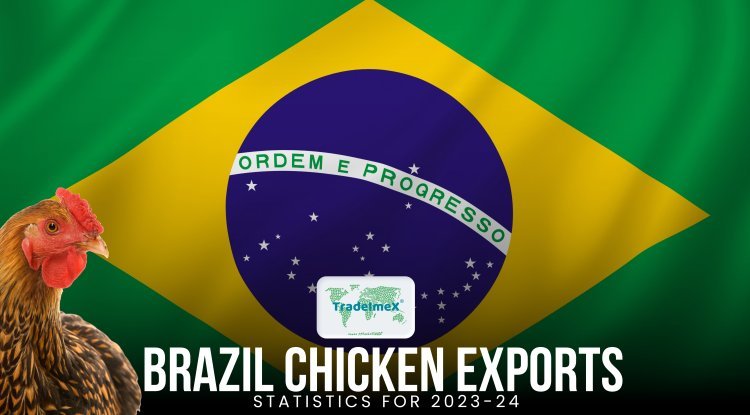Brazil has become the world’s largest exporter of frozen chicken, supplying affordable, high-quality poultry to more than 150 countries. With a reputation for strict food safety standards, Halal certification, and efficient logistics, Brazilian poultry has earned trust in global markets. As global demand for protein continues to rise, frozen chicken export from Brazil is at the heart of international trade, shaping both economic growth and food security.
In this detailed guide, we will explore:
-
The global demand for Brazilian frozen chicken.
-
Key importing countries and market statistics.
-
Current market trends and price fluctuations.
-
Challenges and opportunities for exporters and buyers.
-
Future outlook for Brazil’s poultry industry.
Why Brazil Dominates the Frozen Chicken Export Market
Brazil’s poultry industry has grown into a global leader due to several unique advantages:
-
High Production Capacity – Brazil produces over 14 million tons of chicken annually, with a large share allocated for exports.
-
Cost Efficiency – Favorable climate, abundant feed resources (like corn and soy), and advanced farming techniques lower production costs.
-
Strict Quality Standards – Compliance with global food safety rules (EU, Middle East, Asia) ensures trust.
-
Halal Certification – Brazil supplies a large percentage of Halal-certified frozen chicken, making it the top supplier for Muslim-majority countries.
-
Government Support – Policies encourage poultry exports as a major contributor to Brazil’s economy.
Global Demand for Brazilian Frozen Chicken
The demand for frozen chicken exports from Brazil is fueled by:
-
Growing Population: More people require affordable protein sources.
-
Health & Nutrition Awareness: Chicken is seen as lean, healthier meat compared to red meat.
-
Halal Markets: Middle East, North Africa, and Southeast Asia heavily import Brazilian Halal chicken.
-
Food Service Industry: Fast food chains, hotels, and restaurants rely on bulk frozen chicken imports.
-
E-commerce in Food Trade: Online B2B platforms make frozen chicken accessible to smaller buyers worldwide.
Key Importing Countries (2025 Data Estimates)
-
China – Largest buyer due to high demand for affordable poultry.
-
Saudi Arabia – Biggest Middle Eastern importer of Halal chicken.
-
United Arab Emirates (UAE) – Hub for re-exporting poultry to the wider Gulf.
-
South Africa – Strong demand for affordable protein.
-
European Union – Selective, but imports high-value cuts.
-
Japan & Hong Kong – Prefer frozen chicken wings and legs.
Market Trends in Frozen Chicken Export from Brazil
1. Rising Halal Certification Demand
More than 70% of Brazil’s frozen chicken exports are Halal-certified. With the Muslim population expected to reach 3 billion by 2050, this demand is set to grow further.
2. Growth in African Markets
Africa’s rising population and economic growth drive higher imports of affordable poultry from Brazil. Countries like Nigeria, Angola, and Ghana are rapidly expanding as new markets.
3. Sustainability & Green Farming
Buyers are increasingly concerned about environmental impact. Brazil is adopting renewable energy, efficient feed management, and waste reduction to meet sustainability standards.
4. Online B2B Poultry Trade
Platforms like Alibaba, TradeIndia, and Global Sources are making poultry trade easier for small and mid-sized buyers.
5. Value-Added Chicken Products
Demand for pre-cut, marinated, and processed frozen chicken is growing, especially in Europe and Asia.
Price Trends of Frozen Chicken Exports
-
Prices fluctuate based on global corn & soy costs (chicken feed).
-
In 2024–2025, frozen chicken prices rose by 8–12%, mainly due to inflation and higher logistics costs.
-
Export prices also depend on cut type:
-
Whole frozen chicken: Cheapest option.
-
Chicken wings and legs: Popular in Asia & Africa.
-
Chicken breasts: High-value cuts preferred in Europe & North America.
-
Challenges in Frozen Chicken Export from Brazil
-
Trade Barriers & Tariffs – EU imposes strict quotas.
-
Disease Outbreaks – Avian influenza threats impact trade.
-
Logistics Costs – Rising fuel prices increase shipping expenses.
-
Competition – U.S., EU, and Thailand also export poultry.
-
Regulatory Compliance – Different import requirements for each country.
Opportunities for Buyers & Exporters
✅ New Markets in Asia & Africa – Untapped demand in Vietnam, Bangladesh, and African nations.
✅ Halal Poultry Growth – Expansion of Muslim food markets globally.
✅ Processed Chicken – Value-added products with higher profit margins.
✅ Digital Trade Platforms – Direct exporter-to-buyer transactions reduce middlemen.
Future Outlook (2025–2030)
-
Global poultry consumption expected to grow by 15% in the next five years.
-
Brazil likely to remain the #1 poultry exporter.
-
Sustainability, halal certification, and food safety will dominate future strategies.
-
Demand from China, Middle East, and Africa will continue to drive export growth.
Frozen chicken export from Brazil plays a crucial role in global food supply, offering affordable, high-quality, and Halal-certified poultry to international markets. With rising demand in Asia, Africa, and the Middle East, Brazil is well-positioned to maintain its leadership in poultry exports.
For buyers, Brazil provides not just chicken, but a reliable, sustainable, and globally trusted supply china.

